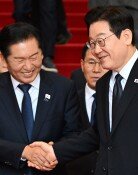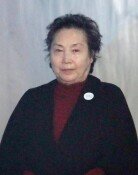Korea, Yonsei, Ewha Reflect the Use of High School Ranking
Korea, Yonsei, Ewha Reflect the Use of High School Ranking
Posted October. 08, 2004 23:02,
The Ministry of Education and Human Resources Developments recent announcement that Korea University, Yonsei University, and Ewha Womans University partially applied a high school ranking system on this years spring semester admissions is stirring intense controversy.
Vice Minister Jung Gi-eon opened a press conference on September 8, and revealed that a search of spring semester admission documents from six universities: Korea University, Yonsei University, Sogang University, Sungkwunkwan University, Hanyang University, and Ewha Womans University, resulted in a finding that proved Korea University, Yonsei University, and Ewha Womans University to have reflected ranking in high schools in screening student records and document evaluation.
The three universities strongly opposed this claim, arguing, The inspection results have been distorted and the ministrys measures infringe upon the right of universities to select their students.
On the other hand, students who have applied and have been rejected from these schools are expected to file group lawsuits, while a possibility of prosecutors investigating universities suspected of applying the high school ranking system will further inflate the controversy.
Lee Jong-baek of the district public prosecutors office in Seoul, while answering questions from the National Assembly regarding investigations at the Seoul high prosecutors office on this day, said, If any evidence is discovered, we will punish them severely.
According to the ministrys announcement, for the last three years, Korea University has been adding zero to one point of extra credit on applicants ranking and record evaluation in considering high school achievements, college entrance exam scores, report cards, and other screening papers.
Out of a total of 100 points, however, only two points were actually reflected, so specific high schools or regions were not disproportionately favored.
It has been discovered that Yonsei University and Ewha Womans University gave generous evaluations to special-purpose high schools. For the last three years, Yonsei University has been giving higher scores to special-purpose high schools in Seoul and other regions, while schools in Gangnam were runners-up in the screening process that evaluated the record of the applicant`s high school in producing successful university entrants, along with academic grades and other references.
Ewha Womans University gave higher scores to special-purpose high schools and schools in the Gangnam area, based on college acceptance rates and alumnis performance included in the self-introduction evaluation.
The acceptance rate from the Seoul Gangnam area in these three universities were 18.2 percent for Korea University, 35.3 percent for Yonsei, and 36.1 percent for Ewha Womans University, higher than the other three universities ratios of 8.3 - 12.6 percent according to the research.
The ministry has decided to demand corrective measures such as improvement policies as a precaution to the three universities, and if unheeded, will take measures such as reducing the number of freshmen, or will impose financial restraints such as reducing grants.
Meanwhile, the ministry has stipulated prohibition of the high school ranking system on the high education laws and advised for spring semester admissions to be based on special selection rather than academic grades, and have reinforced school record preparation with school inspectors, amongst other measures.
The universities each opened a press conference on this day, denying the survey results of the ministry, and retorted that the ministrys survey was limited to this years spring semester admissions and had failed to judge comprehensively the total distribution of students who were accepted through various channels.
In-Chul Lee Sang-Rok Lee inchul@donga.com myzodan@donga.com







